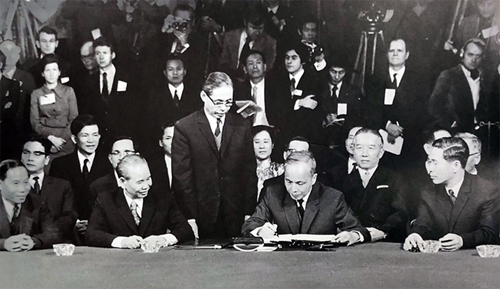This was a turning point in the national history, creating a new advantage for Vietnam’s struggle, contributing to the Spring 1975 General Offensive, which ultimately liberated the South and reunified the country.
    |
 |
|
Minister of Foreign Affairs of the Democratic Republic of Vietnam Nguyen Duy Trinh signs the Paris Peace Accords on January 27, 1973. (File photo) |
A fight on battlefield of diplomacy
Since 1965, together with sending troops to invade the Southern region and conduct the destructive warfare in the Northern region, the U.S. conducted numerous diplomatic campaigns, with an aim to force Vietnam to negotiate unconditionally. Under this scenario, the Party affirmed the determination to fight against the invaders. During the 13th conference of the Party Central Committee in January 1967, the Party decided that the political and military warfare in the Southern region was a decisive factor for the victory in the diplomatic battlefield.
After the Spring 1968 General Offensive and Uprising, the Paris Peace Conference was opened in Paris in May 1968, beginning a fierce fight on the diplomatic battlefield. The conference lasted nearly five years with hundreds of public and secret sessions, 500 press briefings, and 1,000 interviews, and negotiations. On January 27, 1973, the Paris Peace Accords was officially signed, marking the most difficult and lengthy negotiation in the history of national diplomacy.
The Paris Peace Accords consisted of nine chapters and 23 articles, with important contents such as the U.S. and other countries’ commitments to respect the basic national rights and self-determination right of the people of South Vietnam, and the withdrawal of all troops of the U.S. and its allies from the South.
Speaking about the signing of the Paris Peace Accords, Pham Ngac, a member of the delegation of the Democratic Republic of Vietnam to the Paris Peace Conference, said that the agreement was a success of the Vietnamese revolutionary diplomacy, becoming a decisive victory in the national resistance war against the U.S. imperialists, making significant contribution to the Southern liberation and national reunification.
It displayed significant developments and great contribution of the Vietnamese diplomacy.
Valuable lessons
Half a century after the Paris Peace Accords was signed, scientific studies and assessments made by Vietnamese and foreign experts show that the accords brought about several valuable lessons for the country’s diplomacy, namely being consistent in strategy and flexible in policies; upholding the spirit of independence, self-control, positivity and creativeness; and combining military, political and diplomatic warfare.
Vietnam's consistent foreign policy is independence, self-reliance, peace, friendship, cooperation and development with other countries on the basis of respecting independence, sovereignty, territorial integrity, and mutual benefits. Vietnam currently has diplomatic relations with 191 countries out of the total of 193 U.N. member states. In terms of multilateral diplomacy, Vietnam is an active and responsible member of more than 70 important international organizations and forums, such as the U.N., ASEAN, APEC, ASEM, WTO, and more.
The current regional and global situations have witnessed unpredictable changes, but the valuable lessons from the historic Paris Peace Conference half a century ago are still valid and need to be effectively applied in implementing the foreign policy of the 13th National Party Congress, contributing to firmly protecting national independence, sovereignty, and territorial integrity, as well as enhancing the country's position in the international arena.
Translated by Trung Thanh